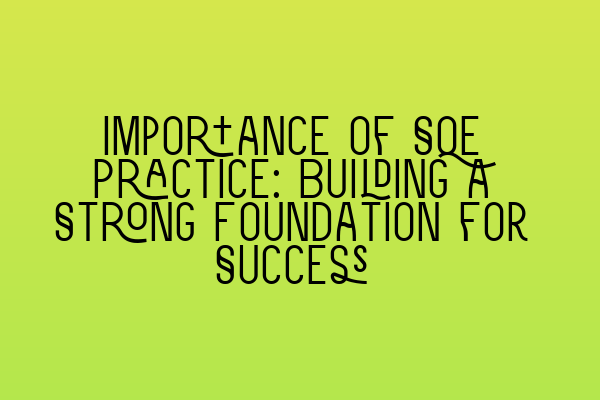The Importance of SQE Practice: Building a Strong Foundation for Success
Preparing for the Solicitors Qualifying Examination (SQE) can be a challenging journey, but it is a necessary step towards becoming a qualified solicitor. The SQE assesses the knowledge and skills necessary for legal practice in the UK, and practicing for the exam is crucial to ensure success. In this article, we will discuss the importance of SQE practice and how it can help build a strong foundation for success in your legal career.
1. Enhancing Legal Knowledge
One of the primary benefits of SQE practice is the opportunity to enhance your legal knowledge. The exam covers various areas of law, including property, commercial leases, tenant rights, property transactions, and land law.
Joint Ownership: Legal Considerations for Co-Owners of Property is an essential aspect of property law that you will encounter in the SQE. By practicing and reviewing this topic, you can deepen your understanding and ensure you are well-equipped to answer related questions in the exam.
Commercial Leases: Essential Insights for Business Premises is another vital subject covered in the SQE. Practicing this topic will help you grasp the legal considerations and intricacies involved in commercial leases.
Tenant Rights in the UK: Understanding Your Legal Protections is an area that every solicitor should be well-versed in. By practicing tenant rights, you will gain a deep understanding of the legal protections and regulations that safeguard tenants.
Property Transactions and the Legal Process: A Comprehensive Guide is a topic that you must master to excel in the SQE. Understanding the intricacies of property transactions and the legal process is crucial in real estate law.
Examining the Intricacies of Land Law in the UK is another critical subject that you will encounter in the SQE. Practicing land law will ensure you have a comprehensive understanding of the legal principles and rules governing land ownership and transfer.
2. Developing Analytical Skills
Success in the SQE requires more than just memorizing legal principles and concepts. It also demands strong analytical skills to apply your knowledge effectively. Regular practice of SQE-style questions enables you to develop these critical skills.
When practicing SQE questions, make sure to analyze the problem, identify the relevant legal issues, and apply the appropriate legal principles to arrive at a sound conclusion. This process will strengthen your analytical abilities and enable you to tackle complex legal scenarios with ease.
3. Building Confidence
Preparing for the SQE through consistent practice builds confidence. As you familiarize yourself with the exam format and practice solving various types of questions, you will become more comfortable and confident in your ability to tackle the exam.
Confidence is key not only for success in the exam but also for your future legal career. By practicing and refining your skills, you will feel more self-assured when handling legal cases and interacting with clients and colleagues.
4. Time Management
The SQE is a time-limited exam, and managing your time effectively during the test is crucial. Regular practice allows you to develop essential time management skills.
By practicing SQE-style questions under timed conditions, you will learn to allocate your time wisely, ensuring that you complete the exam within the given time frame. Time management skills are invaluable in the legal profession, where meeting deadlines is essential.
5. Familiarity with Exam Format
Finally, practicing for the SQE familiarizes you with the exam format, structure, and requirements. Understanding what to expect in the exam can significantly reduce anxiety and increase your chances of success.
By practicing with sample questions and past papers, you will become accustomed to the types of questions asked, the level of detail required in answers, and the overall format of the exam. This familiarity will help you approach the actual exam with confidence and composure.
In conclusion, SQE practice is vital for anyone aspiring to become a solicitor. It enhances legal knowledge, develops analytical skills, builds confidence, improves time management, and familiarizes you with the exam format. By consistently practicing SQE-style questions and topics, you will lay a strong foundation for success in your legal career.

Leave a Reply